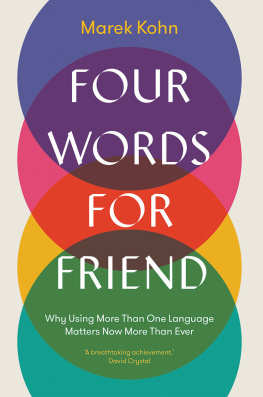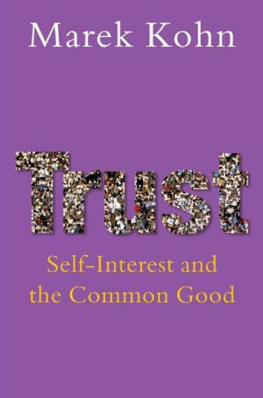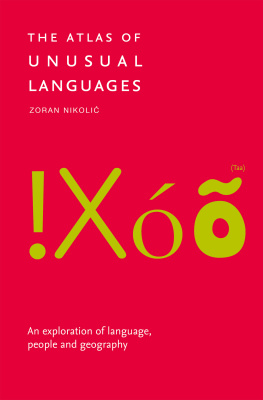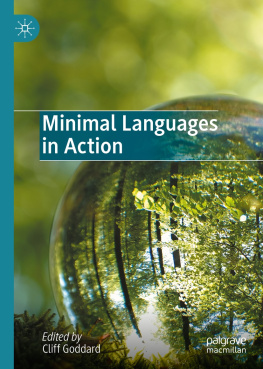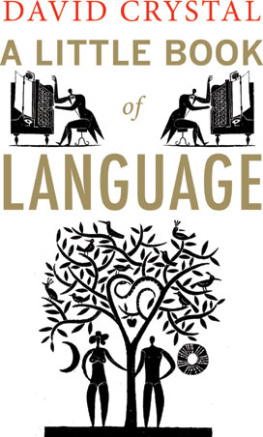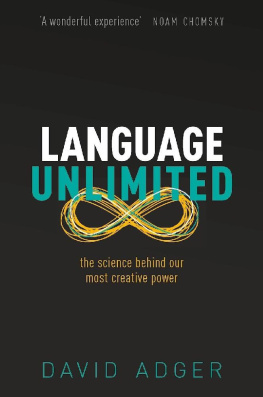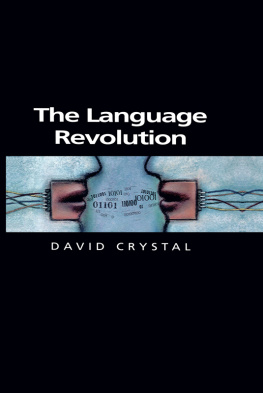FOUR WORDS FOR FRIEND

Copyright 2019 Marek Kohn
All rights reserved. This book may not be reproduced in whole or in part, in any form (beyond that copying permitted by Sections 107 and 108 of the U.S. Copyright Law and except by reviewers for the public press) without written permission from the publishers.
For information about this and other Yale University Press publications, please contact:
U.S. Office:
Europe Office:
Set in Adobe Caslon Pro by IDSUK (DataConnection) Ltd
Printed in Great Britain by TJ International, Padstow, Cornwall
Library of Congress Control Number: 2018962174
ISBN 978-0-300-23108-3
A catalogue record for this book is available from the British Library.
10 9 8 7 6 5 4 3 2 1
For Sue and Teo
Contents
CHAPTER ONE
Other Words Are Possible
If we are to make the most of languages, we have to recognise that they are there to obstruct communication as well as to enable it.
I have written this book in my second language. I would not be able to write it in my first, Polish, which I never finished learning before I went to school and moved decisively into the English speech community. Millions of migrants children follow the same trajectory, leaving the home language behind, and merging into the dominant one. Having lost touch with my first language for many years, before developing a more recent commitment to repair the remaining ramshackle structure and build upon it, I am an entirely typical heritage speaker. My vocabulary is limited, my grammar improvised and to a large extent guesswork. Yet the language is mine, and it is part of me.
Less typical, perhaps, is my conviction that my language history makes me a particularly suitable author for a book on this subject. I am very aware that not being able to do something properly is an unusual attribute to claim as a qualification for writing about it. An effortless polyglot might seem a more obvious person to go to for insights into the plural use of languages. You should certainly go to
My claim is based not on expertise but on another kind of knowledge: often tenuous, fragmentary or occluded, but always present. One of the most influential ideas in the science of bilingualism is that both languages are continuously activated in a bilinguals brain. The awareness that arises from knowledge of more than one language may also be continuously active. It forms part of ones basic understanding of the nature of language, expression, thought and meaning. Although it may go unrecognised in everyday life, it is still there, embedded in ones cognitive constitution. It colours the way one apprehends the world. That is what I mean and try to explain when, if someone asks, I say Im bilingual.
This has been on my mind for almost my entire life. Its why I cant take languages for granted. Theres nothing like losing something to make one appreciate its value (though what that provides me with is a motivation, rather than a qualification, for writing about this subject). And theres something compellingly strange about the enduring presence of that language of the past that withers without ever leaving you. It leaves the sense that it is still up to something. You feel you might manage to glimpse it at work if you could only turn round quickly enough. That, I think, is why tropes about the pursuit of occult or encrypted knowledge appear at certain points in this book.
Not all of the first languages effects are enigmatic. One in particular is clear to me. I know, from a lifetimes experience, that even a limited, unreliable and defective purchase on a language can provide insight into the meaning contained in another language. It creates a background awareness that knowledge and expression are always contingent upon the particular framework of whatever language
Contrasts like these cast each language in a different light. One language provides a perspective on the other. It heightens the constant awareness that there is no one single way of saying something, or understanding it: that whatever words are chosen, other words are possible.

Languages exist both to enable communication and to obstruct it. They establish perimeters inside which information is free to circulate, but across which it is unable to pass. This two-sided character makes it impossible to take languages for granted. The relationships between them need work, or at least thought, just as the relationships between their speakers do. And all these relationships are intertwined. If we can get languages to work together, to flourish in each others company, we will help their speakers to do the same.
Their speakers, ourselves: integrating languages, within communities or within individual minds, is a way to turn competition into co-operation, suspicion into trust, antagonism into conviviality. Its not the only way, but it is a special one. At the most fundamental level, it confounds the division between us and them. It helps us get the best out of human nature, and the most out of human culture.
Although languages cant be taken for granted, many people are able to use more than one without giving the matter a thought. Babies whose carers speak two languages to them, or more, acquire each with equal ease. Countless millions of people switch effortlessly between languages throughout the course of every day, according to where they are and whom they encounter. India, where languages flow into each other and people move routinely between them, may be more representative of language practices around the world than the United States, in which English is dominant and monolingualism prevalent. Even the United States may be more multilingual than it appears, since although the Census Bureau records that about 20 per cent of the population speak a language other than English at home, it does not ask about any of the other ways and settings in which different languages can be used. Bilingualism is as normal and natural as monolingualism. Yet for many people who speak English and only English, it seems little short of miraculous.
One of the reasons for this is that they misunderstand the meaning of fluency and are overawed by a bilingual ideal, that of the balanced speaker who is equally fluent in each language. People tend to think of fluency as a yes-or-no category you are either fluent in a language or you are not rather than the continuum implied by the source of the word. Flow may be smooth or restricted or interrupted; so may fluency. It is a matter of degree. Balanced, or symmetrical, bilinguals are the exception, not the norm. Bilingualism should not be defined by them
Pragmatic and open-sounding as it is, this definition cannot help but tangle with other understandings of bilingualism. The most familiar one sticks to the meaning of bi and reserves the term for the use of two languages. Any more than that is multilingualism, though the word is most often used to describe the presence of a variety of languages in nations, cities or communities, whether or not individuals within them can speak more than one. Plurilingualism has been proposed as an etymologically sound term for the use of two or more languages. It has also been invested with a significance that is similar in spirit to Grosjeans definition, but much more ambitiously inclusive. Rather than posing the question of whether a person meets the criteria necessary to be categorised as bilingual (and everyday use is a criterion that discounts many deep seams of bilingual resources) it asks what they are able to do with different languages. Instead of looking towards mastery of two or more languages, it looks at the entire portfolio of language abilities that the person has at their disposal. They may be able to sustain a conversation in one, employ some useful basic phrases in another, understand what somebody is saying in a third language despite being unable to reply in it, and draw upon their overall body of linguistic knowledge to make inferences about meanings in hitherto unfamiliar languages. In short, the idea is to appreciate the value of all linguistic resources, however imperfect or limited, and to make the most of them.
Next page
